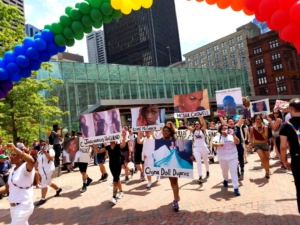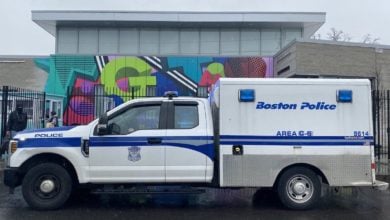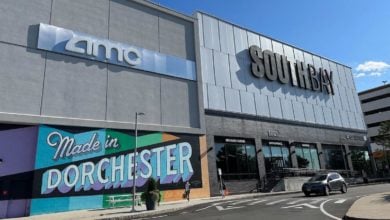On Saturday, June 10, tens of thousands of people took part in the Boston Pride parade, held annually to celebrate and highlight the LGBTQ community and its struggles.
Over 300 groups marched in the parade, each in its own contingent, making the parade so long that groups at the back did not begin marching until several hours after those at the front. The huge parade attracted a diverse crowd from all sectors and layers of society, of all ages, races, ethnicities, sexualities, and genders. Flags representing various aspects of LGBTQ liberation struggles colored the whole length of the parade. Enthusiastic crowds stood at the sidelines of the parade, waving flags, hi-fiving marchers, and cheering each group as it passed.
This year the PSL marched with the radical anti-capitalist Stonewall Warriors contingent, which has marched in Pride for many years. This year’s contingent was larger than usual, with over 100 participants coming together to march and chant with characteristic militancy: “When trans lives are under attack, what do we do? Act up fight back!”, “We’re here/ we’re queer/ we’re fabulous, don’t f*** with us!”, and “The people, united, will never be defeated.”
 In addition to this militant contingent, roughly 50 people took part in an action at the front of the parade with a message that focused on the 12 trans people of color reported killed this year ― Mesha Caldwell, Jamie Lee Wounded Arrow, JoJo Striker, Tiara Richmond (also known as Keke Collier), Chyna Doll Dupree, Ciara McElveen, Jaquarrius Holland, Alphonza Watson, Chay Reed, Kenneth Bostick, Sherrell Faulkner and Kenne McFadden ― by holding signs with their faces and reading their names out to the crowd.
In addition to this militant contingent, roughly 50 people took part in an action at the front of the parade with a message that focused on the 12 trans people of color reported killed this year ― Mesha Caldwell, Jamie Lee Wounded Arrow, JoJo Striker, Tiara Richmond (also known as Keke Collier), Chyna Doll Dupree, Ciara McElveen, Jaquarrius Holland, Alphonza Watson, Chay Reed, Kenneth Bostick, Sherrell Faulkner and Kenne McFadden ― by holding signs with their faces and reading their names out to the crowd.
Both the contingent and the action advocated for the presence of political voices at Pride events, opposition to police and ICE terror, the need to stand up against transmisogynist violence and send a clear message that Black Trans Lives Matter, and to get big money out of Pride.
This group marched at the front of the parade after their action and held a period of silence towards the end, where the crowd was the largest. The affirmation that “Black Trans Lives Matter” broke the silence, with the protesters and majority of Pride attendees chanting this together as the group continued forward.
History of Stonewall and Pride
The first Pride was held in New York City in 1970, on the one-year anniversary of the historic Stonewall Rebellion of June 27, 1969. That night, when New York police carried out one of their frequent raids on the Stonewall Inn, a gay bar, the multinational and diverse crowd inside fought back in self-defense with bricks and bottles. Marsha P. Johnson and Sylvia Rivera, who later went on to form STAR (Street Transvestites Action Revolutionaries), played a major role in the rebellion. The events that night, and succeeding Pride parades, reverberated throughout the U.S. and internationally.
Many have noted how the character of Pride has changed greatly over the intervening decades. The direct action group in Boston Pride criticized organizers for lacking sufficient leadership of queer and trans people of color. They also criticized parade organizers for their relationships with large corporations and the police, which both contribute to the oppression of LGBTQ people.
As the LGBTQ movement impacted the consciousness of tens of millions of people, it went from the margins of society into the mainstream. A section of the ruling class, to retain their own credibility, now formally supports LGBTQ rights. This a contradictory development that has both facilitated the passage of some important reforms, but also redirected much of the movement towards more moderate liberal strategies and attachment to the Democratic Party.
As a result of the ruling-class’s reorientation on this question, even the police, who remain violent enemies of LGBTQ people, particularly working-class and nationally oppressed people, have been compelled to formally take part in Pride parades.
Meanwhile, multinational corporations, often the same ones who fund right-wing bigoted politicians, use Pride opportunistically as an advertising opportunity. They don’t truly care about the status of the LGBTQ community, and actively oppose a strong liberation movement rooted in the working-class — as Stonewall was. It should be noted, however, that a large part of the corporate contingents are LGBTQ workers from these companies, and their supporters, and some have to wage serious struggles at their jobs to compel their bosses to honor Pride.
As a PSL resolution from 2015 on the marriage equality struggle explained:
“The political leadership and official messaging of Pride parades has changed since their inception in the early 1970s. The initial actions confronted the system in a way that the current actions do not. During the first years of Pride, parades condemned police raids and corporations like Coors. Today police departments, politicians and many major corporations dominate the parades in a way that is highly distasteful to progressive people. The fact that they are all there, of course, is a measure of how far the struggle has pushed them.
“Yet despite who is dominating the parades, this does not mean that Pride itself has become a symbol of reaction or a ruling-class tool. There are millions of LGBTQ people who march in the parades and line the streets as a way of asserting their existence and pride, as a recognition of the LGBTQ struggle, and as a means of continuing to demand equality in every aspect of a society that has not afforded the community full equality.
“We want to be with them, reaching them with a political message. Our participation in the parades is geared to them. As the parades become more and more diluted with commercialism and establishment politics, our marching with a political message against bigotry, racism and the system, and for militant fight back and struggle is a vital intervention for us to make every year.”
Voices from the contingent
Diva Williams, an independent activist and organizer of the Stonewall Warriors contingent, told Liberation: “Capitalism is antithetical to queer and trans people of color liberation. Martha P. Johnson, Sylvia Rivera, and so many others brought us this far by resisting capitalism. The needs of the people were always paramount. This is why S.T.A.R. set up housing for the homeless, supported the incarcerated, and stood in solidarity with sex workers. This movement is predicated upon protecting those who have been most harshly affected by the ills of a capitalist society.
Genevieve Rodriguez of The Network / La Red explained to Liberation how the LGBTQ movement, to be really emancipatory for oppressed people, must go far beyond opposing Trump: “The struggles facing LGBTQ communities are vast and vary. Many of these struggles for some have been going on way before this administration.”
Another demonstrator who joined the contingent said they came to Pride both because it is fun and also to be part of a political contingent where they could “fight pinkwashing,” which refers to the ruling-class efforts to cover up their crimes with progressive, pro-LGBTQ rhetoric and imagery. The demonstrator specifically referred to Israeli government public relations, which uses LGBTQ rights to cover for colonial apartheid, as an example of this tactic.
David, another demonstrator, as well as other young people in the contingent who were attending Pride for the first time, spoke more broadly about the need to return to Pride’s radical origins.
The Stonewall Warriors contingent finished the parade marching into the Boston Pride Festival near City Hall. The energetic chant of “The people, united, will never be defeated” fired up both the marchers in the contingent and the crowd watching from the sidewalk. Activists distributing fliers along the edge of the parade received so much interest from the crowd that they could barely keep pace with the rest of the march. Their message had been heard and was well received.






